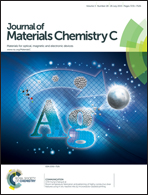Hydroxyl radical-assisted decomposition and oxidation in solution-processed indium oxide thin-film transistors
Abstract
Solution-processed indium oxide TFTs were fabricated by hydroxyl radical-assisted (HRA) decomposition and oxidation. The results show that decomposition and oxidation of carbon is more substantial than metal hydroxides, leading to the elimination of organic residues, correlated to a low interface trap density (S.S. = 0.45 V dec−1, NT = 1.11 × 1012 cm−2) in the device. The resultant HRA indium oxide TFTs exhibit improved electrical characteristics such as the mobility, the on/off current ratio, and the subthreshold swing as well as bias stabilities under PBS and NBS conditions.


 Please wait while we load your content...
Please wait while we load your content...